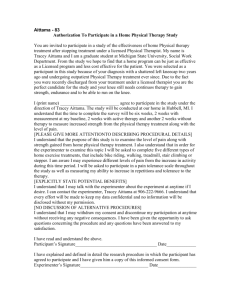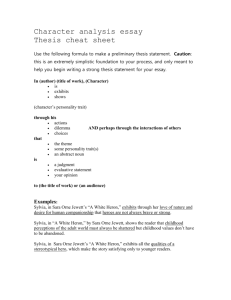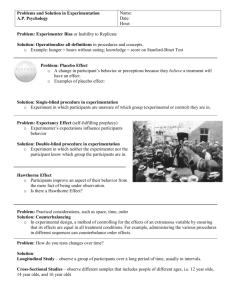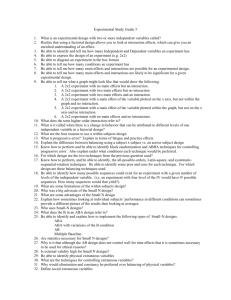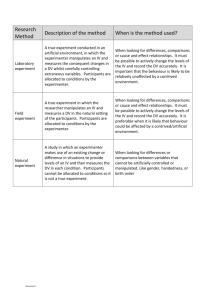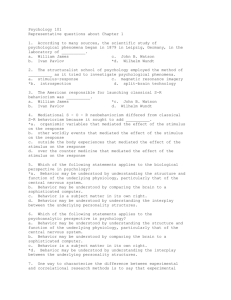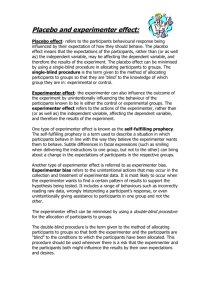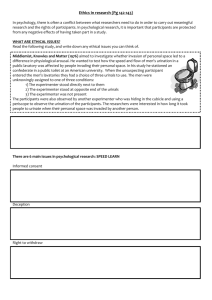Orne, MT, On the social psychology of the psychological experiment
advertisement
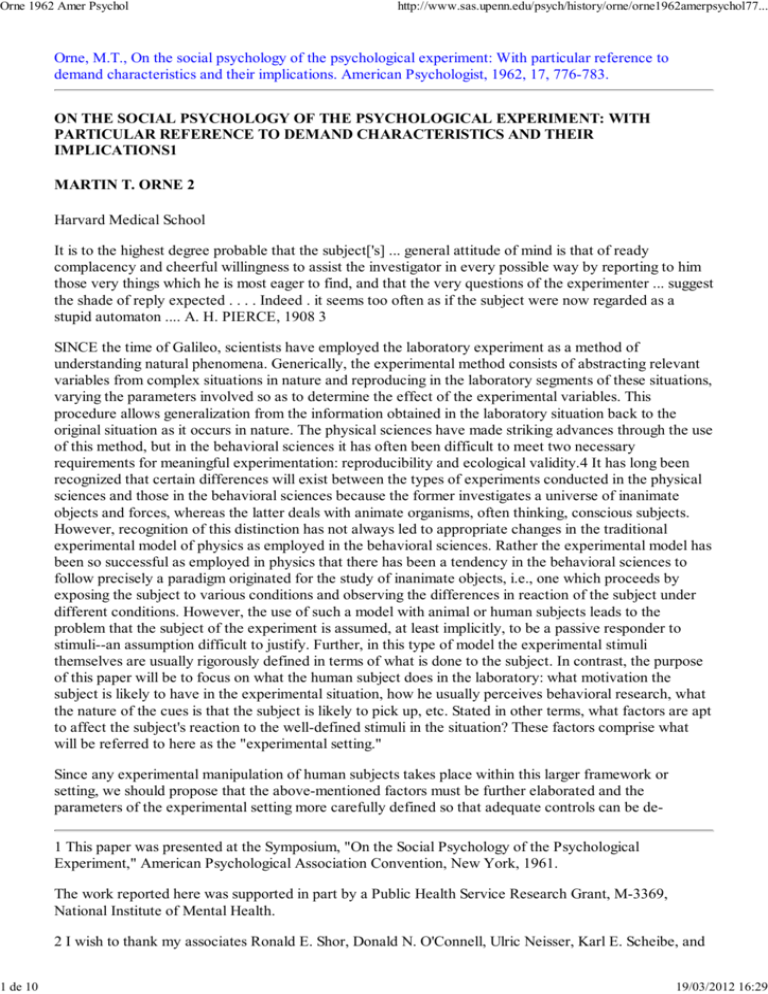
Orne 1962 Amer Psychol 1 de 10 http://www.sas.upenn.edu/psych/history/orne/orne1962amerpsychol77... Orne, M.T., On the social psychology of the psychological experiment: With particular reference to demand characteristics and their implications. American Psychologist, 1962, 17, 776-783. ON THE SOCIAL PSYCHOLOGY OF THE PSYCHOLOGICAL EXPERIMENT: WITH PARTICULAR REFERENCE TO DEMAND CHARACTERISTICS AND THEIR IMPLICATIONS1 MARTIN T. ORNE 2 Harvard Medical School It is to the highest degree probable that the subject['s] ... general attitude of mind is that of ready complacency and cheerful willingness to assist the investigator in every possible way by reporting to him those very things which he is most eager to find, and that the very questions of the experimenter ... suggest the shade of reply expected . . . . Indeed . it seems too often as if the subject were now regarded as a stupid automaton .... A. H. PIERCE, 1908 3 SINCE the time of Galileo, scientists have employed the laboratory experiment as a method of understanding natural phenomena. Generically, the experimental method consists of abstracting relevant variables from complex situations in nature and reproducing in the laboratory segments of these situations, varying the parameters involved so as to determine the effect of the experimental variables. This procedure allows generalization from the information obtained in the laboratory situation back to the original situation as it occurs in nature. The physical sciences have made striking advances through the use of this method, but in the behavioral sciences it has often been difficult to meet two necessary requirements for meaningful experimentation: reproducibility and ecological validity.4 It has long been recognized that certain differences will exist between the types of experiments conducted in the physical sciences and those in the behavioral sciences because the former investigates a universe of inanimate objects and forces, whereas the latter deals with animate organisms, often thinking, conscious subjects. However, recognition of this distinction has not always led to appropriate changes in the traditional experimental model of physics as employed in the behavioral sciences. Rather the experimental model has been so successful as employed in physics that there has been a tendency in the behavioral sciences to follow precisely a paradigm originated for the study of inanimate objects, i.e., one which proceeds by exposing the subject to various conditions and observing the differences in reaction of the subject under different conditions. However, the use of such a model with animal or human subjects leads to the problem that the subject of the experiment is assumed, at least implicitly, to be a passive responder to stimuli--an assumption difficult to justify. Further, in this type of model the experimental stimuli themselves are usually rigorously defined in terms of what is done to the subject. In contrast, the purpose of this paper will be to focus on what the human subject does in the laboratory: what motivation the subject is likely to have in the experimental situation, how he usually perceives behavioral research, what the nature of the cues is that the subject is likely to pick up, etc. Stated in other terms, what factors are apt to affect the subject's reaction to the well-defined stimuli in the situation? These factors comprise what will be referred to here as the "experimental setting." Since any experimental manipulation of human subjects takes place within this larger framework or setting, we should propose that the above-mentioned factors must be further elaborated and the parameters of the experimental setting more carefully defined so that adequate controls can be de1 This paper was presented at the Symposium, "On the Social Psychology of the Psychological Experiment," American Psychological Association Convention, New York, 1961. The work reported here was supported in part by a Public Health Service Research Grant, M-3369, National Institute of Mental Health. 2 I wish to thank my associates Ronald E. Shor, Donald N. O'Connell, Ulric Neisser, Karl E. Scheibe, and 19/03/2012 16:29 Orne 1962 Amer Psychol 2 de 10 http://www.sas.upenn.edu/psych/history/orne/orne1962amerpsychol77... Emily F. Carota for their comments and criticisms in the preparation of this paper. 3 See reference list (Pierce, 1908). 4 Ecological validity, in the sense that Brunswik (1947) has used the term: appropriate generalization from the laboratory to nonexperimental situations. 776 777 SOCIAL PSYCHOLOGY OF THE PSYCHOLOGICAL EXPERIMENT signed to isolate the effects of the experimental setting from the effects of the experimental variables. Later in this paper we shall propose certain possible techniques of control which have been devised in the process of our research on the nature of hypnosis. Our initial focus here will be on some of the qualities peculiar to psychological experiments. The experimental situation is one which takes place within the context of an explicit agreement of the subject to participate in a special form of social interaction known as "taking part in an experiment." Within the context of our culture the roles of subject and experimenter are well understood and carry with them well-delined mutual role expectations. A particularly striking aspect of the typical experimenter-subject relationship is the extent to which the subject will play his role and place himself under the control of the experimenter. Once a subject has agreed to participate in a psychological experiment, he implicitly agrees to perform a very wide range of actions on request without inquiring as to their purpose, and frequently without inquiring as to their duration. Furthermore, the subject agrees to tolerate a considerable degree of discomfort, boredom, or actual pain, if required to do so by the experimenter. Just about any request which could conceivably be asked of the subject by a reputable investigator is legitimized by the quasi-magical phrase, "This is an experiment," and the shared assumption that a legitimate purpose will be served by the subject's behavior. A somewhat trivial example of this legitimization of requests is as follows: A number of casual acquaintances were asked whether they would do the experimenter a favor; on their acquiescence, they were asked to perform five push-ups. Their response tended to be amazement, incredulity and the question "Why?" Another similar group of individuals were asked whether they would take part in an experiment of brief duration. When they agreed to do so, they too were asked to perform five push-ups. Their typical response was "Where?" The striking degree of control inherent in the experimental situation can also be illustrated by a set of pilot experiments which were performed in the course of designing an experiment to test whether the degree of control inherent in the hypnotic relationship is greater than that in a waking relationship.5 In order to test this question, we tried to develop a set of tasks which waking subjects would refuse to do, or would do only for a short period of time. The tasks were intended to be psychologically noxious, meaningless, or boring, rather than painful or fatiguing. For example, one task was to perform serial additions of each adjacent two numbers on sheets filled with rows of random digits. In order to complete just one sheet, the subject would be required to perform 224 additions! A stack of some 2,000 sheets was presented to each subject--clearly an impossible task to complete. After the instructions were given, the subject was deprived of his watch and told, "Continue to work; I will return eventually." Five and one-half hours later, the experimenter gave up! In general, subjects tended to continue this type of task for several hours, usually with little decrement in performance. Since we were trying to find a task which would be discontinued spontaneously within a brief period, we tried to create a more frustrating situation as follows: Subjects were asked to perform the same task described above but were also told that when finished the 19/03/2012 16:29 Orne 1962 Amer Psychol 3 de 10 http://www.sas.upenn.edu/psych/history/orne/orne1962amerpsychol77... additions on each sheet, they should pick up a card from a large pile, which would instruct them on what to do next. However, every card in the pile read, You are to tear up the sheet of paper which you have just completed into a minimum of thirty-two pieces and go on to the next sheet of paper and continue working as you did before; when you have completed this piece of paper, pick up the next card which will instruct you further. Work as accurately and as rapidly as you can. Our expectation was that subjects would discontinue the task as soon as they realized that the cards were worded identically, that each finished piece of work had to be destroyed, and that, in short, the task was completely meaningless. Somewhat to our amazement, subjects tended to persist in the task for several hours with relatively little sign of overt hostility. Removal of the one-way screen. did not tend to make much difference. The postexperimental inquiry helped to explain the subjects' behavior. When asked about the tasks, subjects would invariably attribute considerable meaning to their performance, viewing it as an endurance test or the like. Thus far, we have been singularly unsuccessful 5 These pilot studies were performed by Thomas Menaker. 778 AMERICAN PSYCHOLOGIST in finding an experimental task which would be discontinued, or, indeed, refused by subjects in an experimental setting.6,7 Not only do subjects continue to perform boring, unrewarding tasks, but they do so with few errors and little decrement in speed. It became apparent that it was extremely difficult to design an experiment to test the degree of social control in hypnosis, in view of the already very high degree of control in the experimental situation itself. The quasi-experimental work reported here is highly informal and based on samples of three or four subjects in each group. It does, however, illustrate the remarkable compliance of the experimental subject. The only other situations where such a wide range of requests are carried out with little or no question are those of complete authority, such as some parent-child relationships or some doctor-patient relationships. This aspect of the experiment as a social situation will not become apparent unless one tests for it; it is, however, present in varying degrees in all experimental contexts. Not only are tasks carried out, but they are performed with care over considerable period of time. Our observation that subjects tend to carry out a remarkably wide range of instructions with a surprising degree of diligence reflects only one aspect of the motivation manifested by most subjects in an experimental situation. It is relevant to consider another aspect of motivation that is common to the subjects of most psychological experiments: high regard for the aims of science and experimentation. A volunteer who participates in a psychological experiment may do so for a wide variety of reasons ranging from the need to fulfill a course requirement, to the need for money, to the unvoiced hope of altering his personal adjustment for the better, etc. Over and above these motives, however, college students tend to share (with the experimenter) the hope and expectation that the study in which they are participating will in some material way contribute to science and perhaps ultimately to human welfare in general. We should expect that many of the characteristics of the experimental situation derive from the peculiar role relationship which exists between subject and experimenter. Both subject and experimenter share the belief that whatever the experimental task is, it is important, and that as such no matter how much effort must be exerted or how much discomfort must be endured, it is justified by the ultimate purpose. 19/03/2012 16:29 Orne 1962 Amer Psychol 4 de 10 http://www.sas.upenn.edu/psych/history/orne/orne1962amerpsychol77... If we assume that much of the motivation of the subject to comply with any and all experimental instructions derives from an identification with the goals of science in general and the success of the experiment in particular,8 it follows that the subject has a stake in the outcome of the study in which he is participating. For the volunteer subject to feel that he has made a useful contribution, it is necessary for him to assume that the experimenter is competent and that he himself is a "good subject." The significance to the subject of successfully being a "good subject" is attested to by the frequent questions at the conclusion of an experiment, to the effect of, "Did I ruin the experiment?" What is most commonly meant by this is, "Did I perform well in my role as experimental subject?" or "Did my behavior demonstrate that which the experiment is designed to show?" Admittedly, subjects are concerned about their performance in terms of reinforcing their self-image; nonetheless, they seem even more concerned with the utility of their performances. We might well expect then that as far as the subject is able, he will behave in an experimental context in a manner designed to play the role of a "good subject" or, in other words, to validate the experimental hypothesis. Viewed in this way, the student volunteer is not merely a passive responder in an experimental situation but rather he has a very real stake in the successful outcome of the experiment. This problem is implicitly recognized in the large number of psychological studies which attempt to conceal the true purpose of the experiment from the subject in the hope of thereby obtaining more reliable data. This maneuver on the part of psychologists is so widely known in the college population that even if a psy6 Tasks which would involve the use of actual severe physical pain or exhaustion were not considered. 7 This observation is consistent with Frank's (1944) failure to obtain resistance to disagreeable or nonsensical tasks. He accounts for this "primarily by S's unwillingness to break the tacit agreement he had made when he volunteered to take part in the experiment, namely, to do whatever the experiment required of him" (p. 24). 8 This hypothesis is subject to empirical test. We should predict that there would be measurable differences in motivation between subjects who perceive a particular experiment as "significant" and those who perceive the experiment as "unimportant." 779 SOCIAL PSYCHOLOGY OF THE PSYCHOLOGICAL EXPERIMENT chologist is honest with the subject, more often than not he will be distrusted. As one subject pithily put it, "Psychologists always lie!" This bit of paranoia has some support in reality. The subject's performance in an experiment might almost be conceptualized as problem-solving behavior; that is, at some level he sees it as his task to ascertain the true purpose of the experiment and respond in a manner which will support the hypotheses being tested. Viewed in this light, the totality of cues which convey an experimental hypothesis to the subject become significant determinants of subjects' behavior. We have labeled the sum total of such cues as the "demand characteristics of the experimental situation" (Orne, 1959a). These cues include the rumors or campus scuttlebutt about the research, the information conveyed during the original solicitation, the person of the experimenter, and the setting of the laboratory, as well as all explicit and implicit communications during the experiment proper. A frequently overlooked, but nonetheless very significant source of cues for the subject lies in the experimental procedure itself, viewed in the light of the subject's previous knowledge and experience. For example, if a test is given twice with some intervening treatment, even the dullest college student is aware that some change is expected, particularly if the test is in some obvious way related to the treatment. The demand characteristics perceived in any particular experiment will vary with the sophistication, intelligence, and previous experience of each experimental subject. To the extent that the demand characteristics of the experiment are clear-cut, they will be perceived uniformly by most experimental subjects. It is entirely possible to have an experimental situation with clear-cut demand characteristics for 19/03/2012 16:29 Orne 1962 Amer Psychol 5 de 10 http://www.sas.upenn.edu/psych/history/orne/orne1962amerpsychol77... psychology undergraduates which, however, does not have the same clear-cut demand characteristics for enlisted army personnel. It is, of course, those demand characteristics which are perceived by the subject that will influence his behavior. We should like to propose the heuristic assumption that a subject's behavior in any experimental situation will be determined by two sets of variables: (a) those which are traditionally defined as experimental variables and (b) the perceived demand characteristics of the experimental situation. The extent to which the subject's behavior is related to the demand characteristics, rather than to the experimental variable, will in large measure determine both the extent to which the experiment can be replicated with minor modification (i.e., modified demand characteristics) and the extent to which generalizations can be drawn about the effect of the experimental variables in nonexperimental contexts [the problem of ecological validity (Brunswik, 1947)]. It becomes an empirical issue to study under what circumstances, in what kind of experimental contexts, and with what kind of subject populations, demand characteristics become significant in determining the behavior of subjects in experimental situations. It should be clear that demand characteristics cannot be eliminated from experiments; all experiments will have demand characteristics, and these will always have some effect. It does become possible, however, to study the effect of demand characteristics as opposed to the effect of experimental variables. However, techniques designed to study the effect of demand characteristics need to take into account that these effects result from the subject's active attempt to respond appropriately to the totality of the experimental situation. It is perhaps best to think of the perceived demand characteristics as a contextual variable in the experimental situation. We should like to emphasize that, at this stage, little is known about this variable. In our first study which utilized the demand characteristics concept (Orne, 1959b), we found that a particular experimental effect was present only in records of those subjects who were able to verbalize the experimenter's hypothesis. Those subjects who were unable to do so did not show the predicted phenomenon. Indeed we found that whether or not a given subject perceived the experimenter's hypothesis was a more accurate predictor of the subject's actual performance than his statement about what he thought he had done on the experimental task. It became clear from extensive interviews with subjects that response to the demand characteristics is not merely conscious compliance. When we speak of "playing the role of a good experimental subject," we use the concept analogously to the way in which Sarbin (1950) describes role playing in hypnosis: namely, largely on a nonconscious level. The demand characteristics of the situation help define the role of "good experimental subject," and the responses of the subject are a function of the role that is created. 780 AMERICAN PSYCHOLOGIST We have a suspicion that the demand characteristics most potent in determining subjects' behavior are those which convey the purpose of the experiment effectively but not obviously. If the purpose of the experiment is not clear, or is highly ambiguous, many different hypotheses may be formed by different subjects, and the demand characteristics will not lead to clear-cut results. If, on the other hand, the demand characteristics are so obvious that the subject becomes fully conscious of the expectations of the experimenter, there is a tendency to lean over backwards to be honest. We are encountering here the effect of another facet of the college student's attitude toward science. While the student wants studies to "work," he feels he must be honest in his report; otherwise, erroneous conclusions will be drawn. Therefore, if the subject, becomes acutely aware of the experimenter's expectations, there may be a tendency for biasing in the opposite direction. (This is analogous to the often observed tendency to favor individuals whom we dislike in an effort to be fair.)9 Delineation of the situations where demand characteristics may produce an effect ascribed to experimental variables, or where they may obscure such an effect and actually lead to systematic data in the opposite direction, as well as those experimental contexts where they do not play a major role, is an 19/03/2012 16:29 Orne 1962 Amer Psychol 6 de 10 http://www.sas.upenn.edu/psych/history/orne/orne1962amerpsychol77... issue for further work. Recognizing the contribution to experimental results which may be made by the demand characteristics of the situation, what are some experimental techniques for the study of demand characteristics? As we have pointed out, it is futile to imagine an experiment that could be created without demand characteristics. One of the basic characteristics of the human being is that he will ascribe purpose and meaning even in the absence of purpose and meaning. In an experiment where he knows some purpose exists, it is inconceivable for him not to form some hypothesis as to the purpose, based on some cues, no matter how meager; this will then determine the demand characteristics which will be perceived by and operate for a particular subject. Rather than eliminating this variable then, it becomes necessary to take demand characteristics into account, study their effect, and manipulate them if necessary. One procedure to determine the demand characteristics is the systematic study of each individual subject's perception of the experimental hypothesis. If one can determine what demand characteristics are perceived by each subject, it becomes possible to determine to what extent these, rather than the experimental variables, correlate with the observed behavior. If the subject's behavior correlates better with the demand characteristics than with the experimental variables, it is probable that the demand characteristics are the major determinants of the behavior. The most obvious technique for determining what demand characteristics are perceived is the use of postexperimental inquiry. In this regard, it is well to point out that considerable self-discipline is necessary for the experimenter to obtain a valid inquiry. A great many experimenters at least implicitly make the demand that the subject not perceive what is really going on. The temptation for the experimenter, in, say, a replication of an Asch group pressure experiment, is to ask the subject afterwards, "You didn't realize that the other fellows were confederates, did you?" Having obtained the required, "No," the experimenter breathes a sigh of relief and neither subject nor experimenter pursues the issue further.10 However, even if the experimenter makes an effort to elicit the subject's perception of the hypothesis of the experiment, he may have difficulty in obtaining a valid report because the subject as well as he himself has considerable interest in appearing naive. Most subjects are cognizant that they are not supposed to know any more about an experiment than they have been told and that excessive knowledge will disqualify them from participating, or, in the case of a postexperimental inquiry, such knowledge will invalidate their performance. As we pointed out earlier, subjects have a real stake in viewing their performance as meaningful. For this reason, it is commonplace to find a pact of ignorance resulting from the intertwining motives of both experimenter and subject, neither wishing to create a situation where the particular subject's performance needs to be excluded from the study. 9 Rosenthal (1961) in his recent work on experimenter bias, has reported a similar type of phenomenon. Biasing was maximized by ego involvement of the experimenters, but when an attempt was made to increase biasing by paying for "good results," there was a marked reduction of effect. This reversal may be ascribed to the experimenters' becoming too aware of their own wishes in the situation. 10 Asch (1952) himself took great pains to avoid this pitfall. 781 SOCIAL PSYCHOLOGY OF THE PSYCHOLOGICAL EXPERIMENT For these reasons, inquiry procedures are required to push the subject for information without, however, providing in themselves cues as to what is expected. The general question which needs to be explored is the subject's perception of the experimental purpose and the specific hypotheses of the experimenter. This can best be done by an open-ended procedure starting with the very general question of, "What do you think that the experiment is about?" and only much later asking specific questions. Responses of "I don't 19/03/2012 16:29 Orne 1962 Amer Psychol 7 de 10 http://www.sas.upenn.edu/psych/history/orne/orne1962amerpsychol77... know" should be dealt with by encouraging the subject to guess, use his imagination, and in general, by refusing to accept this response. Under these circumstances, the overwhelming majority of students will turn out to have evolved very definite hypotheses. These hypotheses can then be judged, and a correlation between them and experimental performance can be drawn. Two objections may be made against this type of inquiry: (a) that the subject's perception of the experimenter's hypotheses is based on his own experimental behavior, and therefore a correlation between these two variables may have little to do with the determinants of behavior, and (b) that the inquiry procedure itself is subject to demand characteristics. A procedure which has been independently advocated by Riecken (1958) and Orne (1959a) is designed to deal with the first of these objections. This consists of an inquiry procedure which is conducted much as though the subject had actually been run in the experiment, without, however, permitting him to be given any experimental data. Instead, the precise procedure of the experiment is explained, the experimental material is shown to the subject, and he is told what he would be required to do; however, he is not permitted to make any responses. He is then given a postexperimental inquiry as though he had been a subject. Thus, one would say, "If I had asked you to do all these things, what do you think that the experiment would be about, what do you think I would be trying to prove, what would my hypothesis be?" etc. This technique, which we have termed the preexperimental inquiry, can be extended very readily to the giving of pre-experimental tests, followed by the explanation of experimental conditions and tasks, and the administration of postexperimental tests. The subject is requested to behave on these tests as though he had been exposed to the experimental treatment that was described to him. This. type of procedure is not open to the objection that the subject's own behavior has provided cues for him as to the purpose of the task. It presents him with a straight problem-solving situation and makes explicit what, for the true experimental subject, is implicit. It goes without saying that these subjects who are run on the preexperimental inquiry conditions must be drawn from the same population as the experimental groups and may, of course, not be run subsequently in the experimental condition. This technique is one of approximation rather than of proof. However, if subjects describe behavior on the preinquiry conditions as similar to, or identical with, that actually given by subjects exposed to the experimental conditions, the hypothesis becomes plausible that demand characteristics may be responsible for the behavior. It is clear that pre- and postexperimental inquiry techniques have their own demand characteristics. For these reasons, it is usually best to have the inquiry conducted by an experimenter who is not acquainted with the actual experimental behavior of the subjects. This will tend to minimize the effect of experimenter bias. Another technique which we have utilized for approximating the effect of the demand characteristics is to attempt to hold the demand characteristics constant and eliminate the experimental variable. One way of accomplishing this purpose is through the use of simulating subjects. This is a group of subjects who are not exposed to the experimental variable to which the effect has been attributed, but who are instructed to act as if this were the case. In order to control for experimenter bias under these circumstances, it is advisable to utilize more than one experimenter and to have the experimenter who actually runs the subjects "blind" as to which group (simulating or real) any given individual belongs. Our work in hypnosis (Damaser, Shor, & Orne, 1963; Orne, 1959b; Shor, 1959) is a good example of the use of simulating controls. Subjects unable to enter hypnosis are instructed to simulate entering hypnosis for another experimenter. The experimenter who runs the study sees both highly trained hypnotic subjects and simulators in random order and does not know to which group each subject belongs. Because the subjects are run "blind," the experimenter is more likely to treat the 782 AMERICAN PSYCHOLOGIST two groups of subjects identically. We have found that simulating subjects are able to perform with great effectiveness, deceiving even well-trained hypnotists. However, the simulating group is not exposed to the 19/03/2012 16:29 Orne 1962 Amer Psychol 8 de 10 http://www.sas.upenn.edu/psych/history/orne/orne1962amerpsychol77... experimental condition (in this case, hypnosis) to which the given effect under investigation is often ascribed. Rather, it is a group faced with a problem-solving task: namely, to utilize whatever cues are made available by the experimental context and the experimenter's concrete behavior in order to behave as they think that hypnotized subjects might. Therefore, to the extent that simulating subjects are able to behave identically, it is possible that demand characteristics, rather than the altered state of consciousness, could account for the behavior of the experimental group. The same type of technique can be utilized in other types of studies. For example, in contrast to the placebo control in a drug study, it is equally possible to instruct some subjects not to take the medication at all, but to act as if they had. It must be emphasized that this type of control is different from the placebo control. It represents an approximation. It maximally confronts the simulating subject with a problemsolving task and suggests how much of the total effect could be accounted for by the demand characteristics--assuming that the experimental group had taken full advantage of them, an assumption not necessarily correct. All of the techniques proposed thus far share the quality that they depend upon the active cooperation of the control subjects, and in some way utilize his thinking process as an intrinsic factor. The subject does not just respond in these control situations but, rather, he is required actively to solve the problem. The use of placebo experimental conditions is a way in which this problem can be dealt with in a more classic fashion. Psychopharmacology has used such techniques extensively, but here too they present problems. In the case of placebos and drugs, it is often the case that the physician is "blind" as to whether a drug is placebo or active, but the patient is not, despite precautions to the contrary; i.e., the patient is cognizant that he does not have the side effects which some of his fellow patients on the ward experience. By the same token, in psychological placebo treatments, it is equally important to ascertain whether the subject actually perceived the treatment to be experimental or control. Certainly the subject's perception of himself as a control subject may materially alter the situation. A recent experiment 11 in our laboratory illustrates this type of investigation. We were interested in studying the demand characteristics of sensory deprivation experiments, independent of any actual sensory deprivation. We hypothesized that the overly cautious treatment of subjects, careful screening for mental or physical disorders, awesome release forms, and, above all, the presence of a "panic (release) button" might be more significant in producing the effects reported from sensory deprivation than the actual diminution of sensory input. A pilot study (Stare, Brown, & Orne, 1959), employing preinquiry techniques, supported this view. Recently, we designed an experiment to test more rigorously this hypothesis. This experiment, which we called Meaning Deprivation, had all the accoutrements of sensory deprivation, including release forms and a red panic button. However, we carefully refrained from creating any sensory deprivation whatsoever. The experimental task consisted of sitting in a small experimental room which was well lighted, with two comfortable chairs, as well as ice water and a sandwich, and an optional task of adding numbers. The subject did not have a watch during this time, the room was reasonably quiet, but not soundproof, and the duration of the experiment (of which the subject was ignorant) was four hours. Before the subject was placed in the experimental room, 10 tests previously used in sensory deprivation research were administered. At the completion of the experiment, the same tasks were again administered. A microphone and a one-way screen were present in the room, and the subject was encouraged to verbalize freely. The control group of 10 subjects was subjected to the identical treatment, except that they were told that they were control subjects for a sensory deprivation experiment. The panic button was eliminated for this group. The formal experimental treatment of these two groups of subjects was the same in terms of the objective stress-four hours of isolation. However, the demand characteristics had been purposively varied for the two groups to study the effect of demand character11 Orne, M. T., & Scheibe, K. E. The contribution of nondeprivation factors in the production of sensory 19/03/2012 16:29 Orne 1962 Amer Psychol 9 de 10 http://www.sas.upenn.edu/psych/history/orne/orne1962amerpsychol77... deprivation effects : The psychology of the "panic button.." J. abnorm. soc. Psychol., 1964, 68, 3-12. 783 SOCIAL PSYCHOLOGY OF THE PSYCHOLOGICAL EXPERIMENT istics as opposed to objective stress. Of the 14 measures which could be quantified, 13 were in the predicted direction, and 6 were significant at the selected 10% alpha level or better. A Mann-Whitney U test has been performed on the summation ranks of all measures as a convenient method for summarizing the overall differences. The one-tailed probability which emerges is p = .001, a clear demonstration of expected effects. This study suggests that demand characteristics may in part account for some of the findings commonly attributed to sensory deprivation. We have found similar significant effects of demand characteristics in accounting for a great deal of the findings reported in hypnosis. It is highly probable that careful attention to this variable, or group of variables, may resolve some of the current controversies regarding a number of psychological phenomena in motivation, learning, and perception. In summary, we have suggested that the subject must be recognized as an active participant in any experiment, and that it may be fruitful to view the psychological experiment as a very special form of social interaction. We have proposed that the subject's behavior in an experiment is a function of the totality of the situation, which includes the experimental variables being investigated and at least one other set of variables which we have subsumed under the heading, demand characteristics of the experimental situation. The study and control of demand characteristics are not simply matters of good experimental technique; rather, it is an empirical issue to determine under what circumstances demand characteristics significantly affect subjects' experimental behavior. Several empirical techniques have been proposed for this purpose. It has been suggested that control of these variables in particular may lead to greater reproducibility and ecological validity of psychological experiments. With an increasing understanding of these factors intrinsic to the experimental context, the experimental method in psychology may become a more effective tool in predicting behavior in nonexperimental contexts. REFERENCES ASCH, S. E. Social Psychology. Englewood Cliffs, N. J., 1952. BRUNSWIK, E. Systematic and representative design of psychological experiments with results in physical and social perception. (Syllabus Series, No. 304) Berkeley: Univer. California Press, 1947. DAMASER, ESTHER C., SHOR, R. E., & ORNE, M. T. Physiological effects during hypnotically requested emotions. Psychosom. Med., 1963, 25, 334-343. FRANK, J. D. Experimental studies of personal pressure and resistance: I. Experimental production of resistance. J. gen. Psychol., 1944, 30, 23-41. ORNE, M. T. The demand characteristics of an experimental design and their implications. Paper read at American Psychological Association, Cincinnati, 1959. (a) ORNE, M. T. The nature of hypnosis: Artifact and essence. J. abnorm. soc. Psychol., 1959, 58, 277-299. (b) PIERCE, A. H. The subconscious again. J. Phil., Psychol., scient. Meth., 1908, 5, 264-271. RIECKEN, H. W. A program for research on experiments in social psychology. Paper read at Behavioral Sciences Conference, University of New Mexico, 1958. ROSENTHAL, R. On the social psychology of the psychological experiment: With particular reference to 19/03/2012 16:29 Orne 1962 Amer Psychol 10 de 10 http://www.sas.upenn.edu/psych/history/orne/orne1962amerpsychol77... experimenter bias. Paper read at American Psychological Association, New York, 1961. SARBIN, T. R. Contributions to role-taking theory: I. Hypnotic behavior. Psychol. Rev., 1950, 57, 255-270. SHOR, R. E. Explorations in hypnosis: A theoretical and experimental study. Unpublished doctoral dissertation, Brandeis University, 1959. STARE, F., BROWN, J., & ORNE, M. T. Demand characteristics in sensory deprivation studies. Unpublished seminar paper, Massachusetts Mental Health Center and Harvard University, 1959. The preceding paper is a reproduction of the following article (Orne, M.T. On the social psychology of the psychological experiment: With particular reference to demand characteristics and their implications. American Psychologist, 1962, 17, 776-783.). It is reproduced here with the kind permission of the American Psychological Association © 1962. No further reproduction or distribution of this article is permitted without written permission of the publisher. 19/03/2012 16:29
